#the boy and the heron spoilers
Explore tagged Tumblr posts
Text
just… Goro Miyazaki starting his animation career with having a son kill his father, the king of a kingdom where magic is disappearing, and run away and Hayao (possibly ending) his career with a young boy refusing to take on his family’s powerful legacy over a magical world, knowing the world would die without him in favor of not abandoning his family and choosing to live contentedly in the mundane world…
#reactorshaft babble#not star wars#the boy and the heron#hayao miyazaki#goro miyazaki#studio ghibli#tales from earthsea#media analysis#meta#the boy and the heron spoilers#father son relationship#🥺🥺🥺#spoilers
9K notes
·
View notes
Text
I’m thinking about Mahito’s great great uncle maintaining and preserving a peaceful and beautiful thing in a way that to an outside observer looks tedious and unimportant, hoping to pass the duty off to a successor but ultimately he cannot find one and dies with it.
I’m thinking about the specificity of the blocks being made and handled with care, not with malice or ill intent.
I’m thinking about Hayao Miyazaki, a bastion of beautiful 2d hand drawn animation who refuses to retire.
I’m thinking about a world where animation is so rarely made with love over profit and efficiency.
I’m thinking about how, though the old man didn’t see it, the next generation still hangs onto a piece of that beautiful, tedious thing and takes it with them because it feels important.
I’m thinking about Mahito being told he should forget, but no. He shouldn’t.
#the boy and the heron#the boy and the heron spoilers#tbath#how do you live#hayao miyazaki#studio ghibli#I love seeing a film that I can’t quite process right away and then hours later my brain is like DING DING DING PROCESSED!#fully crying actual tears right now I’m Not Okay#I hope he knows how much he means to so many people
6K notes
·
View notes
Text
Was anyone going to tell me that the Boy and the Heron is only the international title. The original and real title is How Do You Live?, which is the title of pre existing book that is referenced in the film. More importantly it made me stop obsessing over what makes the heron a deuteragonist so essential his bond with Mahito is crucial to the title and instead look at the themes of progressing in life and over coming grief, something I consider to be a much more moving part of the film. Deeply upset that I was working off that title which feels much blander than How Do You Live. Help
#did everyone else know this??? i avoided press or spoilers to go in#also i should make it clear mahito and the heron gave a great dynamic but i didnt feel like it was the focus of the film#the boy and the heron#the boy and the heron spoilers
4K notes
·
View notes
Text
They told you to fix a world they couldn't but you realized you can't fix it with the broken, maliced soaked blocks they leave behind. So you choose to a different way, one that embraces the world and its impurities but you keep a block because to forget is to repeat.
#the boy and the heron#the boy and the heron spoilers#yeah i'm fine#yeah I'm filled with hope#yeah I'm crying#studio ghibli#hayao miyazaki#anime
4K notes
·
View notes
Text
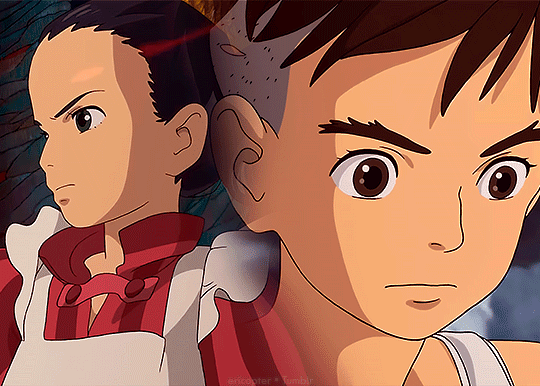

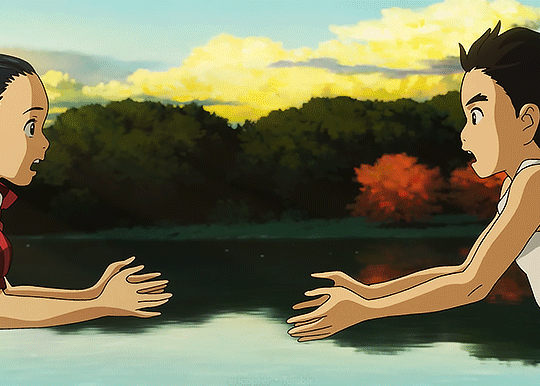
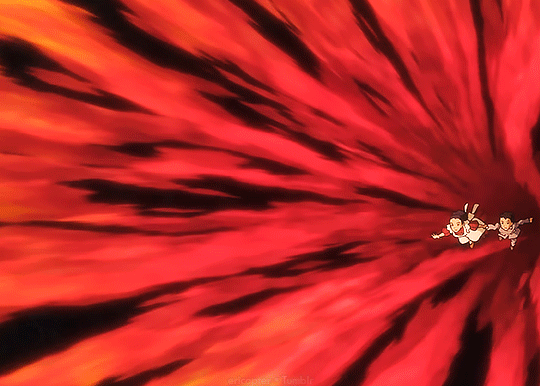

「 大きくなった 眞人君に 」 to grown-up Mahito
君たちはどう生きるか how do you live? (2023)
#how do you live#the boy and the heron#studio ghibli#the boy and the heron spoilers#hayao miyazaki#ghibliedit#ghiblifilm#ghiblisdaily#e.g#e.w#animanga#kimitachi wa do ikiru ka
874 notes
·
View notes
Text

#the boy and the heron#meme#shitpost#196#alfred hitchcock#the birds#the boy and the heron spoilers#studio ghibli#hayao miyazaki
530 notes
·
View notes
Text
i keep thinking about the boy and the heron / how do you live and how at the end the grand uncle asks mahito to build a new world with the stones because only someone truly good supposedly can create a good world. and how mahito says he can’t touch the stones and can’t build a new world because the injury and scar he gave himself are a visible reminder that he is not solely good and has the capability to be bad as well. and how that is such a human thing, such a thing about growing up, where you realise the world you live in and you as a person aren’t entirely good or entirely evil but a little bit of both. but returning to that world is still worth your time, no matter how deep you wander into yourself or another idealised fantasy altogether.
347 notes
·
View notes
Text
You know I did think that tweet that was like "have you never seen a movie before? you watch it and information is revealed" was a bit of an exaggeration but legit the three people behind me last night at 'The Boy and the Heron' not only were talking to each other for the ENTIRE runtime of the film, every SINGLE time anything interesting happened AT ALL they would instantly start being like "whos that? what's with the bird guy? isn't that the old lady from before? is that his grand-uncle? oh is her power fire? is that because she died in a fire? maybe she's not dead? oh is the world going to disappear? what's with the delivery room? why are they stacking blocks? is the tower from space?" and it took literally ALL of my fucking self-control to not turn around and ask them if they are aware of how movies work.
#this is actually just me being a petty bitch but when you are my age it is very rare to get to see a NEW studio ghibli movie IN THEATERS#and I would prefer to not do it with a goddamn greek chorus behind me#the boy and the heron spoilers#spoilers
294 notes
·
View notes
Text

mahito doodles from the boy and the heron 🦜
#saw this a few days back but i am still processing this movie#so much symbolism eeeeee#mahito#the boy and the heron#the boy and the heron spoilers#ghibli fanart#hayao miyazaki#illustration#warawara#my art#studio ghibli#fanart#artists on tumblr
301 notes
·
View notes
Text
While I recognise that the boy and the heron is making deeply nuanced and complex statements I personally refuse to be sympathetic towards the greatuncle because he did that to the pelicans and I am on the side of the pelicans.
#tbath#the boy and the heron#the boy and the heron spoilers#I've been reading takes on it and very few people seem to be talking about my main impression of that world#which is throughout that something was Very Very Wrong#because things which should not be in it had been brought in and twisted#and that's the act of. if not a malicious creator. at least an ignorant one#for me the destruction of the world wasn't a tragic destruction of something beautiful. it was a necessary destruction of something Wrong
190 notes
·
View notes
Text
escapism in "the boy and the heron"
Interrupting my regularly scheduled programming of Good Omens brainrot for this attempt to process the wonderful, fantastical, and distinctly discombobulating experience of watching Hayao Miyazaki’s “The Boy and the Heron.���
Miyazaki’s films, at least to me, have never been straightforward to follow. Spirited Away, for example, is a beautiful masterpiece whose meaning is difficult to decipher on a first watch, and is only fully unveiled when you dive headfirst into research of Japan’s context and the movie’s many symbolic themes. The Boy and the Heron takes this typical Miyazaki complexity and ineffability and turns it up to eleven. There are so many elements that seem random, so many narrative arcs and characters all warring for attention (what is the tower? why are the parakeets so goddamn bloodthirsty? why is the blue heron such a creepy old man?), that combine to create a whimsical but overall also very strange landscape.
I know that art in general does not have to have “meaning” or “a message” to be deserving of our love and attention. Art can be touching, affecting, disturbing, provoking - any number of things that would give it credit - and damn it if The Boy and the Heron isn’t all of these combined. But.
But.
This is also a Miyazaki movie, and he has proven once and time again why he is the master of hidden meaning, and so here, in no particular order, are my half-formed rambles on what I have personally think each movie detail that I struggled to puzzle out initially is about.
(spoilers below, so proceed with caution!)
The tower, time, and escapism
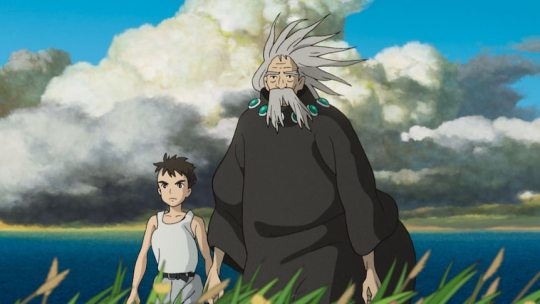
The tower is the central mystery point of the movie - a literal mystical rock that crashed down from the heavens and later lured Mahito’s grand-grand uncle (let’s call him the Tower Master for convenience’s sake) into its depths. Within the tower is a mirage world filled with magic but no real living beings, controlled by the whims of the Tower Master and nothing else that remotely resembles logic or reality. The tower also contains a series of doors that seem to lead to different points in time, if the ending is to go by and how the 13 blocks are meant to be pieces of worlds the Tower Master has visited. So what is this strange and fantastic realm, and what role does it play in the overarching narrative?
My hypothesis is that the Tower is a pocket free from the influence of time (think like the TVA in Loki) - a separate island running parallel to the fabric of the universe that contains portals to different points of past, present, and future. By itself, the pocket has no life or substance; it must be filled by the imagination - pure imagination, untethered to reality - of its main (human) inhabitant. This is why most of the ships are illusions rather than real objects, why the parakeets are so ridiculously odd and behave nothing like real
birds, why the fish is the size of Kiriko’s damn ship. Anything that is real, has to be brought in from the real world (see: the pelicans, Himi, and Kiriko). This is also why the parakeet king immediately topples the tower: yes, he is not the Tower Master’s descendant, but he is also not inherently a real sentient being, and an imaginary object cannot in itself sustain a further imagination.
So why does the Tower Master choose to sequester himself in this alternate space, where he can only exist alone with his own mysterious creations? I think the Tower Master represents those of us who wish to escape from reality, to inhabit worlds which we can control, where pain doesn’t have to touch us if we don’t wish for it (whether I’m projecting reallyyyyy hard at this point does not matter ok). He is an insanely avid reader, with books literally piled in small mountains throughout his living quarters, and don’t we readers (i.e me, again) always wish for escapism? The Tower Master, then, is an example of those who would rather become entrapped in our own minds rather than deal with the world beyond us - maybe, even in a way, a little like Miyazaki himself, whose imagination is so powerful but is also extremely singular and all-consuming, anchoring him to his creative work without reprieve of retirement until his reserves run dry (not to imply that the man is a hermit or that I want him to retire, quite the opposite in fact, but parallels, no matter how shaky, can still be drawn).
This, too, explains why the Tower Master needs Mahito to control the world for him. It is not because he’s grown old, since he cannot be affected by time in the Tower, but it is because his imagination is stagnating - he is no longer capable of finding new ways to balance the tower, he cannot sustain the fantasy any longer. In itself, this can already serve as a message from Miyazaki - we cannot hope to live only within the confines of our minds if we do not interact at all with the real world, because then at some point we will run out of material, of lived experiences to build on top of, and threaten to crumble the fragile imaginary world we have created.
Himi and her fire powers

Himi is a strange hiccup in the system - a rare occurrence of a living person in this fantasy playland that wasn’t brought into it during Mahito’s own entrance, like Kiriko. This theory is a little bit out there, I can totally appreciate that myself, but remember that one year in which Mahiko disappeared from the real world and then came back completely unchanged? I think she chose to stay there for much longer than a year, knowing that time didn’t work the same in this pocket world and she always had the chance to return to her original timeline through the handy door-portals. I think Himi has stayed there essentially until she met Mahito - so long that she actually grew into a part of the fantasy, developing impossible pyrokinetic powers and becoming a set part of the landscape in exchange for extended youth. But this stay didn’t come without consequences. In the real world, Mahiko passes away in a fire, at a younger age than would be expected. Perhaps this, in itself, is a punishment for cheating time - the universe reclaiming the years that Himi spent in the Tower. It’s also definitely not a coincidence that Himi can control fire in the Tower, and dies by fire in the real world; a form of lethal poetic justice, if you will. Seeing Mahito was the trigger for Himi to leave, to embrace her own destiny, because she could now see and be proud of the outcomes of her life and not have regrets about missing out on the life passing her by. (This interpretation would then necessarily imply a deterministic version of life and time, so it’s probably not everyone’s cup of tea, but I think it makes sense in this version because you see doors way farther down than the present which Mahito steps into.)
The starving pelicans
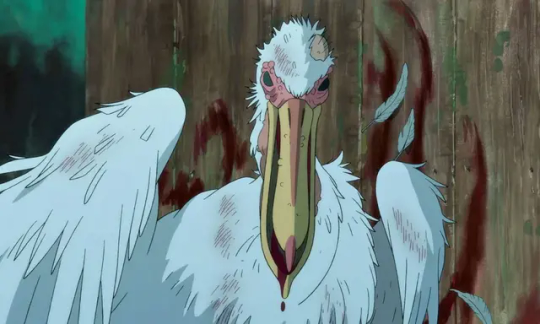
The pelicans are another anomaly because they, too, are not figments of the Tower Master’s imagination, but instead have been brought into this fantasy world, for one reason or another, likely against their will. And this is where the Tower Master’s escape from reality cracks and burns at the foundation - he creates harm rather than good when he brings in the pelicans, because he does not account for the fact that they cannot exist without a source of food, and they then are forced to eat the Warawara to survive. The movie states that the Warawara are like baby souls, who ascend to become new lives, but I think it’s a little more metaphorical than literal rebirth. For me the Warawara are metaphorical ideas or seedlings of inspiration, the only parts of the Tower Master’s creations which aren’t fully formed, but allowed to grow by themselves and escape into the world - like passing the spark of creation to others outside the Tower. And the pelicans, involuntary prisoners of the Tower Master’s fantasy world, must prey on the Warawara before they have the chance to become real. This can be seen (if you squint real hard and do some violent spins so your vision is hella blurry) as the beginning of the end of the Tower Master’s reign - the forceful inclusion of other sentient beings inside his imagination doesn’t help him enrich his internal realm, but rather snuffs out the genuine inspiration that he could be passing onto others, creating pain where the Tower Master hoped to be spared from it.
Mahito’s rejection of the Tower
So with this central “Tower as escapism” theory, what does Mahito’s rejection to take over for the Tower Master mean? There is a moment that was so subtly powerful in that final exchange between the two, when Mahito stops denying the truth by telling everyone that he got his scar from falling, and instead admits that self-harm was the actual cause. At the beginning of the movie, I viewed that moment of very painful self-harm as Mahito’s wish to withdraw from the challenges of life - to live in isolation away from the grief over losing his mother, the challenges of being the rich new kid in town, the overwhelming discomfort of seeing his father shack up with his aunt. His reality is agonizing for him, and the fantasy land is so beautiful in its strange way that it could become a safe haven away from his trauma. But when Mahito says “no”, he is choosing reality; he is choosing to do the hard work, to face all the hardships life can throw at him, because he feels finally strong enough to not need to use imagination as an escapist crutch. In those final moments, Mahito is choosing to live in a world that he cannot control, because no matter how tough things get, he doesn’t have to do it alone - and that’s what I think Miyazaki is telling us too.
Of course, the movie also deals with themes of class conflict and war profiteering; grief and acceptance; continuing your ancestors’ legacies versus paving your own path, which many have already discussed and I don’t particularly have anything new to add to. Regardless, these themes are masterfully woven into the plot, as per usual, and serve to elevate the movie’s emotional impact into something heart-twisting and truly unforgettable.
Alright, ramble over - back to fandom lurking!
#the boy and the heron#studio ghibli#hayao miyazaki#the boy and the heron spoilers#robin rambles#the kind of movie that makes you think#or perhaps overthink??#the boy and the heron meta
217 notes
·
View notes
Text
I thought Sophie was my fave Studio Ghibli protag.
But Mahito was just so immediately down for murder that now I'm seriously contemplating if I need to rethink some things.
#dreamer talks#the boy and the heron#the boy and the heron spoilers#mahito#studio ghibli#sophie could definitely kill a man#mahito just followed through on his threat right fucking away
263 notes
·
View notes
Text
I do want to talk quick about the pelicans in The Boy and The Heron. While in the theater, I kept my mind open to symbols and metaphors that could slide into a larger narrative about war and grief, and these fit pretty well. The pelicans can no longer find fish to eat and are recruited and told to eat the Warawara. They don’t want to, and they didn’t know that’s what they’d be eating until they got there. There’s nothing else to eat. Their children are growing up different, they hardly know how to fly anymore.
It reminder me of soldiers drafted for war and sent to defeat whoever they’re pointed towards bc they have no choice. I’m glad Mahito buries the Pelican properly.
I looked up what the pelican symbolizes in Japan, and the first result says they represent parents who sacrifice themselves for their children. Sounds about right.
I think this connects largely to Mahito’s shifting perspective on the war and the people who fight it. He loses his mother to a fire caused by an air raid. She dies in a hospital, filled with children and other patients. I wonder if he possibly resents his father throughout the movie, because he builds aircraft, which will inevitably be used for more destruction (just like Miyazaki and his father). And then the pelicans say they have no choice and fear for the future their children will grow in and he starts redirecting his anger away from his father and heal?
Idk, I’ve only seen the movie once, and this is based off my 2+ day old memory. What do other people think?
#the boy and the heron#the boy and the heron spoilers#tbath#tbath spoilers#studio ghibli#how do you live#hayao miyazaki
4K notes
·
View notes
Text
Robert Pattinson is getting rightfully praised for his performance in The Boy And The Heron but i think another voice actor for the dub deserves some hype since, until reading the Indiewire article, i had no idea that two characters were voiced by the same person
#talking vaguely to avoid spoilers but yeah#'two characters' in quotes#the boy and the heron#how do you live?#the boy and the heron spoilers#how do you live? spoilers#florence pugh
175 notes
·
View notes
Text
also I love how the warawara - the latest in a line of cute Ghibli creatures - look so dementedly excited as they watch a fish get gutted. it's oddly pure and innocent, despite the context? you really get the feeling these are basically (unborn) children, I feel like.
#the boy and the heron#boy and the heron#the boy and the heron spoilers#boy and the heron spoilers#studio ghibli#ghibli#my post#my posts
170 notes
·
View notes
Text

How Do You Live?
#the boy and the heron#studio ghibli#the boy and the heron spoilers#my art#i love the soundtrack for this movie sooo much
104 notes
·
View notes